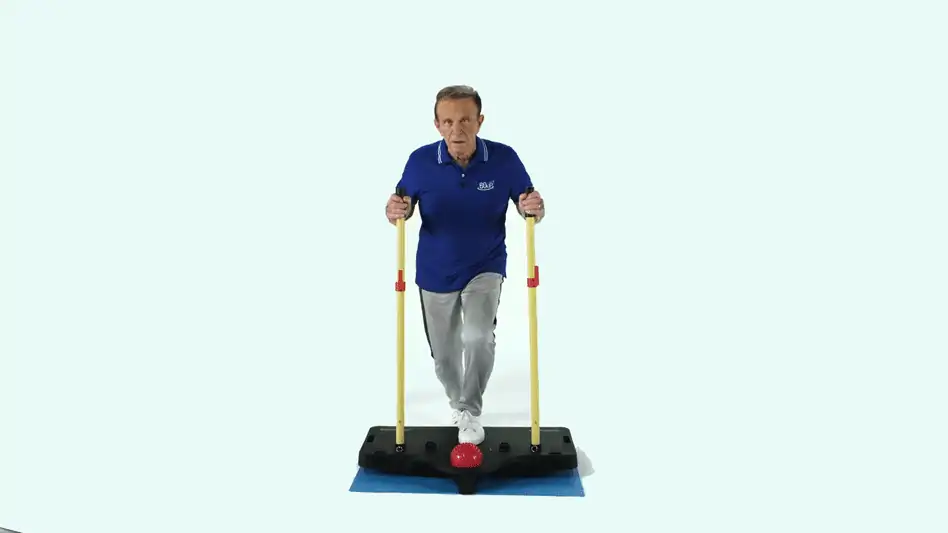Balance boards are becoming a popular way for seniors to improve their balance and coordination.
While the jury is still out on whether or not they are truly effective, early research suggests that there may be some benefits to using them.
The boards are used in many different ways.
Some people use them for exercising, while others simply want to improve their balance.
Balance boards can help improve your balance and neuromuscular control.
This improved coordination and stability usually make you feel more confident on your feet, reducing the likelihood of falls.
[ez-toc]

Are balance boards good for seniors?
Yes, balance boards can be helpful for seniors.
Many seniors struggle with balance and coordination problems.
Balance boards may help improve these issues, by improving your neuromuscular control and dynamic stability.
These changes may make you feel more confident on your feet, reducing the likelihood of falls.
If you are comfortable using a balance board, it is unlikely to cause any harm.
However, they are not for everyone.
Balance boards can be challenging and may require a lot of coordination and strength to use correctly.
If you already have poor balance or experience pain while standing on the board, it probably isn’t safe for you to use.
What helps seniors with balance?
The best way to improve balance is through exercise.
Exercises that have you moving your arms and legs while focusing on maintaining your position can help improve stability and coordination.
10 Simple Balance Exercises for Seniors:
- Head Rotation
- Foot Taps
- Marching
- Rock the Boat
- Clock Reach
- Alternating Vision Walks
- Single-Leg Raises
- Body Circles
- Grapevine
- Sit-To-Stands
Using a balance board can improve your balance.
However, it is not safe for everyone.
Talk to your doctor before using one if you have any concerns or questions about if they are good for seniors.
Balance boards can be helpful for many seniors but aren’t for everyone.
For more details and advice about balance boards, see the full article here.
What are balance boards?
Balance boards are flat board-like structures that have a small surface area.
They work by being placed on the ground so that one side is raised higher than the other.
The person who is using the board then places his/her feet on both sides of it and leans onto it.
As they lean into the board, the lower side is supposed to raise up slightly so that the person must use his/her core muscles to keep balance.
The main purpose of using a balance board is to improve your stability and neuromuscular control (how the brain sends signals to your muscles).
Balance boards can be used in many different ways.
Some people like to use them as part of exercises, while others simply want to improve their coordination for everyday tasks.
Why seniors should use them?
Seniors who have balance or coordination problems are the most likely to benefit from using a balance board.
Balance boards are easier to use than traditional therapy exercises and can be used as a fun form of exercise.
Using a board for balance and exercise is easier on your knees, hips, and back than other forms of exercise..
Balance boards may also help people who do not typically participate in regular physical activity (like seniors) become more active.
Why should I NOT use them?
If you have any balance or coordination problems, talk to your doctor first before using a balance board.
Balance boards may not be the best option for people who already have poor balance or experience pain while standing on them.
Balance boards can also be challenging and may require a lot of coordination and strength to use correctly.
You should not use a balance board if you have any pain or injuries when attempting to stand on them.
If you don’t feel comfortable using one, there are many other options for improving your balance (like exercising) that might be other good choices for you.
How to use a balance board correctly (for seniors)?
Before you start using your balance board, you should make sure that you are physically able to do so.
You may need to work with a physical therapist or trainer to help learn how to use one safely and effectively.
You can use a partner to help you hold the board, or use the wall to brace yourself.
You should start by standing on your board with both feet flat.
Don’t lean forward so that it raises up at first because there is a risk of falling off if you are not used to using them.
Once you can stand on it correctly, try doing exercises
Start by standing on the board with both feet, then take a step forward onto just one leg.
If you feel unstable, slowly bring your other foot back onto the board to make it more stable before continuing with the exercise.
Repeat this step as needed until you feel comfortable balancing on one leg.
Next, try lifting up your arms and moving them from side to side as you balance on the board for 30 seconds.
You can increase the difficulty level by slowly bringing your arms closer to your chest while balancing on the board.
Using a balance board is something that you can do alone or with a friend or family member.
For more information about how to use a balance board, check out this article.
How often should I use it?
You should talk to your doctor about what is the best option for you.
Exercising 5 days a week is usually recommended, but if you are not used to exercising then it might be too much.
Once you get more comfortable using one and want to increase the difficulty level, you can try doing exercises off of your board.
Benefits of using a balance board for seniors :
- Improves balance and coordination.
- Can be used as a fun form of exercise (for those who do not like traditional exercises).
- Eases stress on the body during standing and walking which may help with falls.
Negative aspects:
- The board may be difficult to use for those who have poor balance and coordination (must get used to them first).
- May cause pain and injuries due to poor balance or coordination.
- Putting too much weight on the board can cause it to tip over; this risk increases when you do exercises off of the board.
Final Thoughts
Seniors who want to improve their balance and coordination will benefit from using a balance board because it is easy on the joints and can be done at home.
However, if you do not feel comfortable using one it might be best to avoid them (especially if you have any injuries or poor coordination).
You should talk to your doctor before you start using a balance board so they can help recommend which option might
